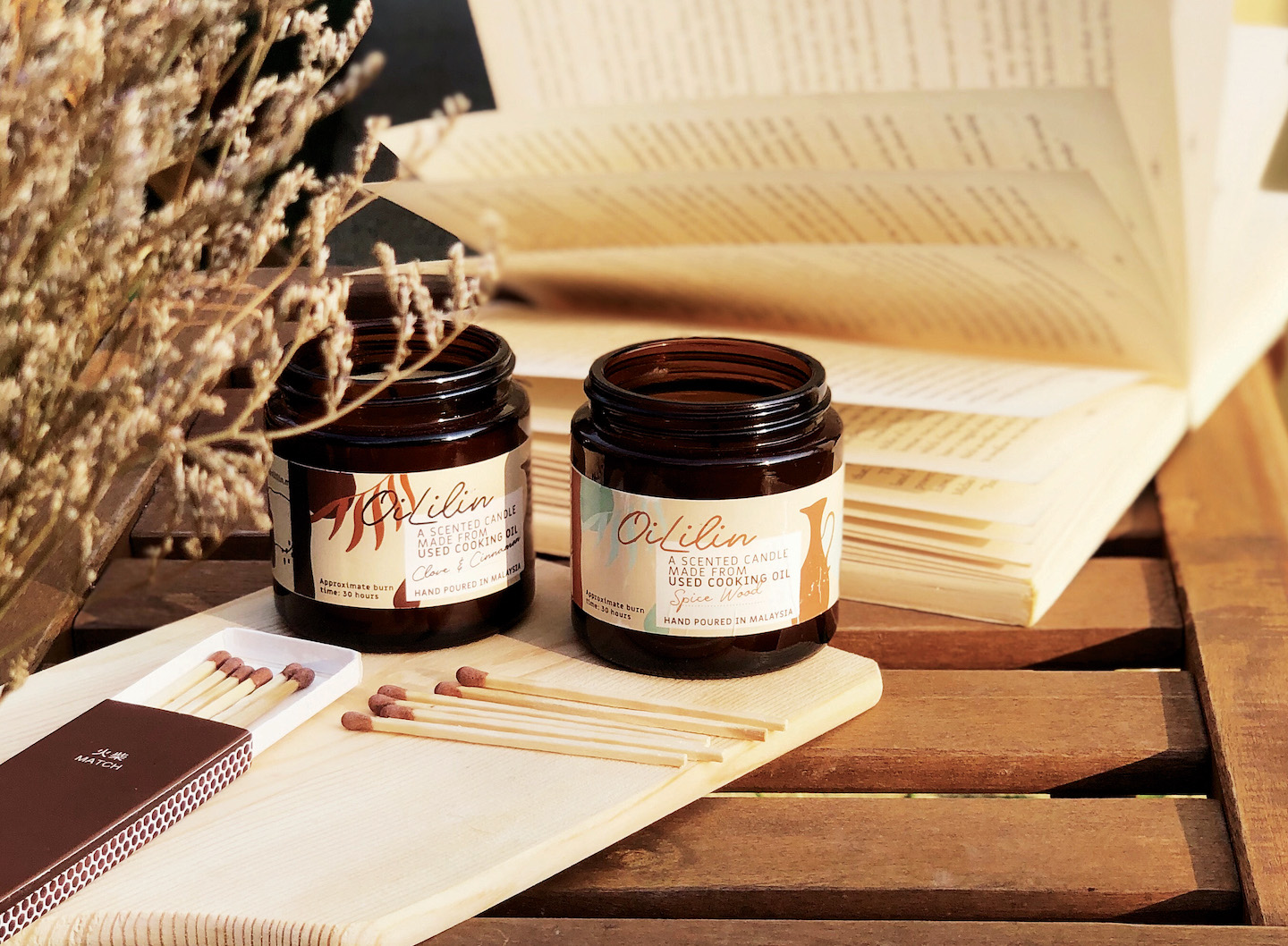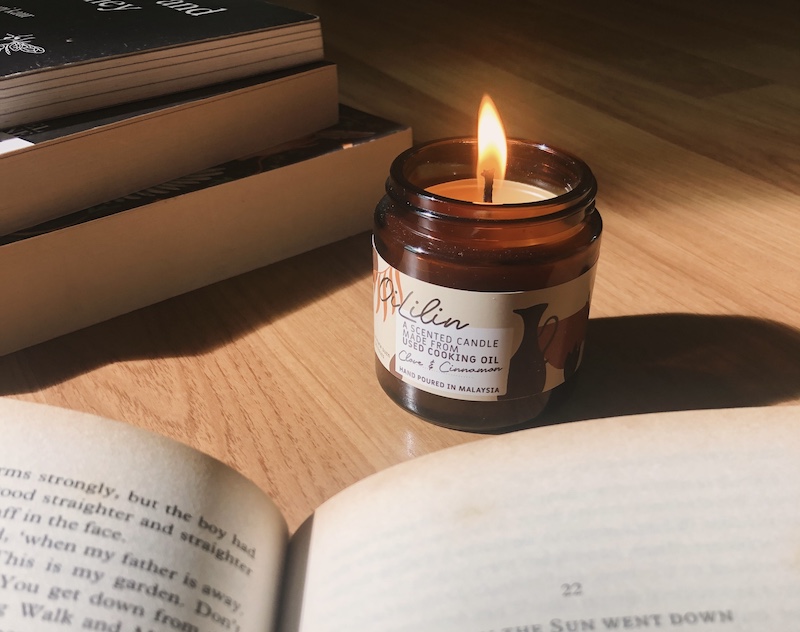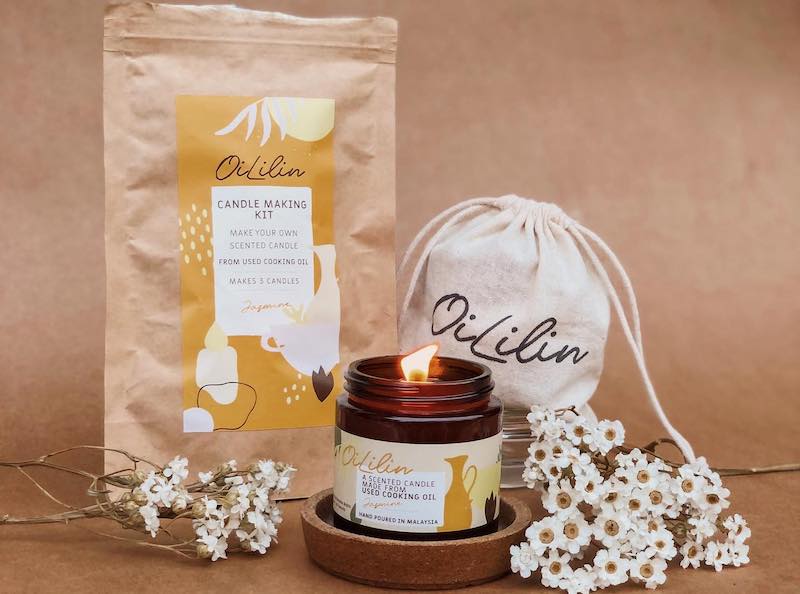
The homegrown label produces up to 2,000 candles a month and one production run uses between 50 and 60 litres of recycled cooking oil (All photos: OiLilin)
I’ve always tried to champion environmental causes,” says Redza Ridzuan, one of the founders of OiLilin. Prior to setting up the brand, he launched an app to tackle food wastage by cafés and bakeries in the Klang Valley.
It was the restaurant owners with whom he worked at the time who alerted him to a problem that was often overlooked but needed to be addressed. “They said, ‘We have a lot of used cooking oil and we’re not sure what to do with it.’ Most businesses choose to just throw it away while more eco-conscious ones repurpose it, making biodiesel or soap.”
Redza pondered over the thought, but having learnt from previous endeavours, he knew he would need support and manpower. He roped in two friends, Ashaari Rahmat and Nuramalina Alias, to help him realise his environmentally conscious vision.
They began experimenting with making soaps and candles using unusual ingredients and eventually came out with their first collection. “We launched it in December 2019. We opened a booth and offered two scents to test the market,” says Redza.
redza_profile_photo_1.jpeg

OiLilin received good response from customers who were intrigued by their fresh idea. However, they were curious about the hygiene and — as you would have guessed — the smell of the products. “People wondered whether the candles would smell like ikan goreng or ayam goreng. When we first started to convert the oil, the odour was incredibly strong,” he says.
The only other company they came across doing something similar was located in another continent. “We found a partner in Slovenia and communicated with them through email to exchange knowledge,” says Redza, adding that having competition in the market can be healthy as businesses get to learn from each other. However, that is missing from the local scene right now.
The next challenge came from having to sort out the condition of the oil, which takes longer to process because it is concentrated with a strong odour and dark colour. “[Our Slovenian partner’s] oil is different from ours because Malaysians tend to recycle or reuse their oil multiple times. In Europe, they only use it to fry French fries. They don’t even need to filter the oil. But we have to because there is a lot of residue.”
OiLilin developed a fragrant powder to resolve the one issue everyone was worried about — odour. “For every 100ml of oil, we use 20g of scented powder. Those in Europe may use less powder, but we need a higher volume because of the strong smell of our oil,” Redza explains.
Launched in March 2020, OiLilin — a portmanteau of the words “oil” and lilin (Malay for “candle”) — produces up to 2,000 candles a month and one production run uses between 50 and 60 litres of recycled cooking oil. The five restaurants it works with provide 15 to 20 litres of the substance every two weeks.
oililin_product_photo_5.jpg

To pre-empt questions of whether the oil used is halal, Redza says, “We only work with halal-certified restaurants to be on the safe side. Each outlet has oil of a different colour and concentration based on what they cook with it. Oil from restaurants that use it to fry French fries, burgers and meat differs from that used for frying rice or noodles. And some outlets use olive oil.”
Unlike candles sold on the market, which are usually white, OiLilin’s scented wax is slightly yellowish or brownish, depending on the concentration of the oil used. Thus, the team decided to use minimalist black jars to house the candles so as to shift the focus away from the colour, says Redza.
Different concentrations of oil give the candles different colours, even though they have the same scent. Working with multiple food premises has opened up opportunities for OiLilin to attract corporate clients. “We had those who wanted the candles to be lighter, so they could use their customised jars. Brighter-coloured oil is allocated for such projects,” he says.
Ingredients and production were not the only obstacles faced by the partners. With three individuals running the business, it was sometimes difficult for them to arrive at a decision. “We come from different backgrounds and each of us have a distinct work ethic. However, we now have mentors to show us the way to manage ourselves. It has been really helpful to set certain expectations, so all of us can work towards achieving that goal,” Redza shares.
candle_kit_making.jpeg

OiLilin has expanded its range of scents from the initial apple and blueberry to include fig milk (a crowd favourite), spicewood, jasmine, mojito as well as clove and cinnamon. Apart from planning to launch products with a vanilla scent soon, it is also looking to penetrate the Singapore market.
At the height of the pandemic, OiLilin also came up with a do-it-yourself candle-making kit, comprising 60g of fragrant powder, three cotton wicks, three wick holders, a measuring spoon and instructions. “You only need a jar, used cooking oil, our DIY kit, a microwave and three minutes to make three 100g scented candles.”
The brand collaborated with influencers who would film themselves making candles to show audiences that it was indeed safe and easy for parents and children to do the activity together. It also greatly benefited from the #Kitajagakita campaign, launched during lockdowns to help small businesses.
“It helped us to grow and we even achieved a five-figure revenue in the first month we launched OiLilin,” Redza reveals.
Ultimately, the company aims to have everyone convert waste cooking oil into something usable. “My vision for OiLilin is to see our DIY kit in every home in Malaysia. Saving the environment has to start from the home. We want every house to have our product so people can reuse oil in a good way,” he says.
This article first appeared on June 6, 2022 in The Edge Malaysia.


